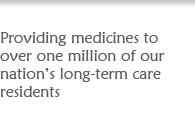|
LTCPA Issues Statement on Maine Rx Program and Medicaid Prior-Authorization Requirements
January 22, 2003 -- In recognition of today's oral arguments before the U.S. Supreme Court in PhRMA v. Concannon, the Long Term Care Pharmacy Alliance (LTCPA) issued the following statement:
LTCPA filed a friend-of-the-court brief in PhRMA v. Concannon out of concern that the Maine Rx program will harm some of Maine's most vulnerable patients -- the frail elderly in the state's nursing homes.
The Maine program's prior-authorization requirement will have the practical effect of preventing long-term care pharmacies from dispensing the right drugs in the right doses at the right times to the nursing-home residents they serve.
Mandating prior authorization of the drugs of certain manufacturers for reasons unrelated to treatment will harm the interests of Maine Medicaid patients in violation of the federal Medicaid statute and Congressional intent in enacting the Medicaid program. The Maine Rx program does not use prior authorization to protect Medicaid beneficiaries from over-utilization or to improve the efficiency, economy or quality of care. Instead, based on budgetary factors, it utilizes prior authorization as a means of extracting supplemental state rebates from pharmaceutical manufacturers.
As the American Society of Consultant Pharmacists, the professional society for pharmacists who specialize in caring for the frail elderly, noted in a recent paper, "While health care cost savings represent an important element to the design of any Medicaid program, it should never take priority over selecting pharmaceuticals specifically suited to meet the individual needs of all seniors."
It is for the fundamental reasons that the LTCPA filed its friend-of-the-court brief on behalf of Maine's patients, particularly the frail elderly in the state's nursing homes.
# # #
Amicus Brief in PhRMA v. Concannon, Opposes Prior Authorization Based Solely on Cost (PDF)
|


